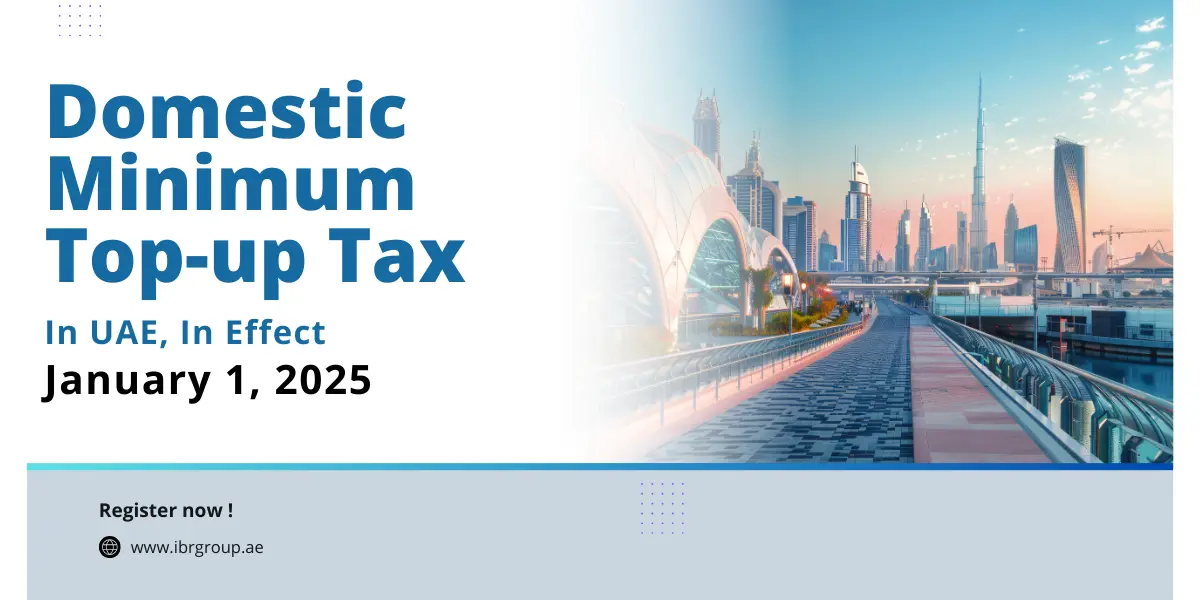
Domestic Minimum Top-up Tax in UAE to Take Effect January 1, 2025
UAE Corporate Tax Law: New Growth, DMTT from 2025
In addition to proposing tax incentives to encourage innovation and the creation of high-value jobs, the UAE stated on December 9, 2024, that it will implement a domestic minimum top-up tax (DMTT) on January 1, 2025. Thus, the present corporation tax rate of 9 percent will be raised to a minimum of 15 percent for large multinational enterprises (MNEs) operating in the United Arab Emirates on profits made within the nation. According to the Ministry of Finance, this modification will take effect for fiscal years starting on or after January 1, 2025.
Significant revisions to Federal Decree-Law No. 47 of 2022 on the Taxation of Corporations and Businesses have been announced by the UAE Ministry of Finance, marking a step forward in bringing the country into compliance with international tax norms and promoting economic expansion.
The main changes, which were unveiled on December 9, 2024, include the implementation of a domestic minimum top-up tax and suggested tax breaks meant to encourage high-value jobs and innovation.
DMTT or Domestic Minimum Top-up Tax
The UAE’s endorsement of the Organisation for Economic Co-operation and Development’s (OECD) Two-Pillar Solution is reflected in the DMTT, which will go into effect for fiscal years beginning on or after January 1, 2025. Large multinational corporations (MNEs) are required under Pillar Two to maintain an effective tax rate of at least 15% on their profits in each of the nations in which they conduct business.
MNEs with consolidated worldwide revenues of €750 million or more in at least two of the four fiscal years prior to the measure’s implementation will be subject to it. The UAE’s dedication to promoting an open and just tax system will be strengthened by the close alignment of its DMTT framework with the OECD’s Global Anti-Base Erosion (GloBE) Model Rules.
Tax breaks to promote innovation and growth
The UAE is thinking about implementing new corporate tax incentives to encourage innovation, high-value employment, and sustainable growth in order to increase its appeal as a worldwide commercial hub.
1. Tax incentives for research and development (R&D)
The proposed R&D tax incentive is anticipated to go into effect on January 1, 2026, with the goal of promoting economic growth and innovation. Companies in the UAE that engage in qualified R&D activities may be entitled for a 30–50% refundable tax credit on their eligible expenses. These qualifying operations will guarantee high standards and international compliance by adhering to the OECD’s Frascati Manual principles..
2. A valuable incentive for employment
It is also being discussed to implement a refundable tax credit that targets high-value employment activities started January 1, 2025. Employing senior professionals, such as C-suite executives and other key persons involved in fundamental company operations that greatly enhance the UAE’s economic competitiveness, is the goal of this incentive.
To further encourage the hiring of outstanding people and enhance the UAE’s reputation as a business-friendly destination, the credit will be computed as a percentage of qualified salary expenditures.
Considering the future
In order to achieve sustainable economic growth and bring its tax system into compliance with international norms, the UAE must implement the DMTT and the suggested tax incentives. To help businesses understand these changes, the Ministry of Finance will release further guidelines and statutory details.
These changes are anticipated to strengthen the UAE’s standing as a major international business hub by increasing its appeal to multinational firms and creative businesses.
